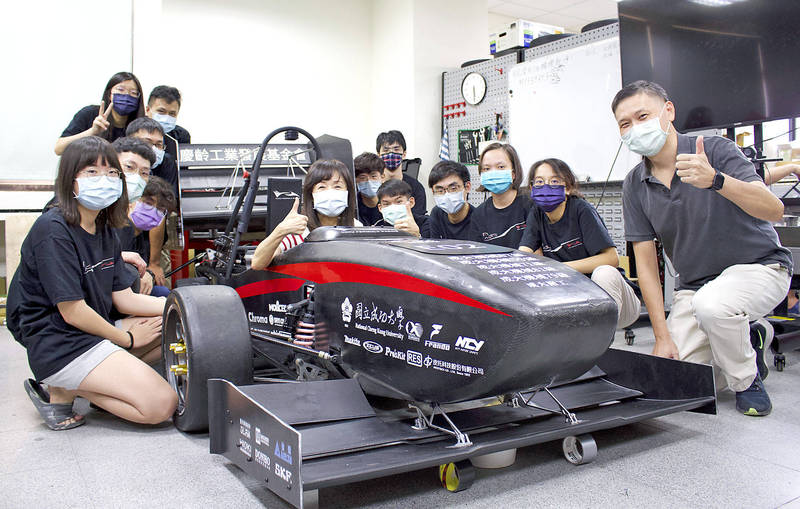《TAIPEI TIMES》 NCKU students set records with electric car

National Cheng Kung University (NCKU) Formula SAE team captain Su Chia-fen, front left, NCKU president Su Huey-jen, seated in car, and NCKU Mechanical Engineering Department dean Chu Tzu-cheng, front right, on Sunday attend a news conference at the university to announce its car for the Formula SAE competition. Photo courtesy of National Cheng Kung University
/ Staff writer
Students at National Cheng Kung University (NCKU) have developed the nation’s first electric race car for Formula SAE, which has set speed records with the team’s female driver, it said on Sunday.
Formula SAE is a student design competition organized by SAE International to challenge participants “to conceive, design, fabricate and compete with small formula-style racing cars,” its Web site says.
Teams have eight to 12 months to design, build and prepare their vehicles for a competition, it adds.
Due to the COVID-19 pandemic, more than half of Taiwanese universities did not develop vehicles for the competition, while Japanese schools have not competed in the event for the past two years, the team said.
“Our team was one of a few who made a car during the pandemic, and the only team to make an electric car,” it said. “We hope to enter the competition with it next year.”
The team was particularly proud of their captain, Wu chia-fen (吳佳芬), who set records on the track, it said.
The team’s car this year is the third generation in a series, and cost more than NT$2 million (US$71,390) to make, it said, adding that the team worked on the car for a year.
“We’ve reduced the car’s weight from 340kg in the first generation all the way down to 260kg,” engineering professor Huang Chen-wei (黃晨瑋) said. “We also replaced the single engine with a twin electric motor.”
To compensate for the vehicle’s extra power, the team added an aerodynamic kit, which includes front and rear spoilers, and a skirt, it said.
With the modifications the car is able to go from zero to 100kph in only three seconds, the team said, adding that it also shaved two seconds off its cornering time.
Team member Tseng Chih-chung (曾志仲) said the group strives to improve the car every year, with the aim of securing a good performance record for the nation.
“Due to the pandemic, we had to spend 1.5 times more time this year on our car. Things like electric-motor components and computer chips were scarce,” he said. “We were checking inventory online every day.”
Disease prevention regulations prevented the team from meeting in person for several months, he said, adding that teammates would complete their designs on their own, meet up online and then take turns assembling components at the school.
“It was hard working that way, but in the end we succeeded,” he said.
At a news conference to announce the completion of the vehicle, NCKU president Su Huey-jen (蘇慧貞) named the car “Honor,” adding that the team’s hard work and achievements had brought honor to the university.
Wu, 23, has driven all three generations of the team’s cars.
“When I get in the driver’s seat I like to put the pedal to the metal. I like the sensation of flying down the track at high speed,” she said.
Driving a car that she helped build brought her a great sense of achievement, she added.
Meanwhile, team member Chen Yu-hsien (陳諭嫻) said her test drive of the team’s second-generation vehicle last year was her first time driving a racing car.
The experience was “novel and exciting,” she said.
“Racing cars is something men and women can both do, but women might have the speed advantage given their lighter bodies,” teammate Su Yi-fan (蘇懌帆) said.
The team has about 50 members who work on different aspects of the vehicle, from electric-motor assembly and body to team finances, it said, adding that the members come from different departments at the university.
“The older students pass their experience to the younger ones. Even though we cannot go abroad right now, building this car has really given us a sense of accomplishment,” the team said.
Their next goal is to further improve the vehicle’s design with an eye on competing next year in Japan if the pandemic subsides, the team said.
NCKU is to celebrate its 90th anniversary next month. Anyone who would like to join the celebrations can visit the Web site https://90th.ncku.edu.tw for more information.
新聞來源:TAIPEI TIMES



















